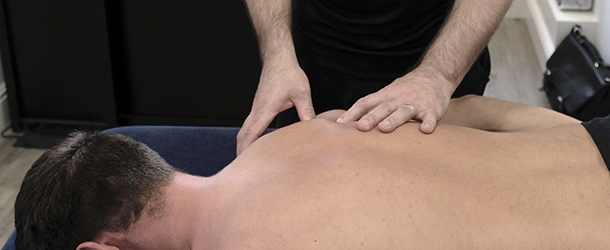Shoulder Pain
Chartered Physiotherapy in Blackpool, St. Annes, Lytham, Poulton, Cleveleys and FleetwoodThe shoulder is a joint in demand. Highly mobile, it relies heavily on the surrounding muscles to help it to function with full movement. Shoulder pain is surprisingly common and can have a number of different causes. Diagnosing a shoulder condition should involve a detailed assessment of movement, identifying any trigger points.

What are the different types of shoulder pain?
Rotator cuff injuries are a common cause of shoulder aches and pains, usually starting as inflammation (rotator cuff tendonitis). Rotator cuff injuries normally produce weakness, loss of movement and pain across the shoulder. If the tendonitis isn’t quickly managed, it can turn into a partial or complete rotator cuff tear. Physiotherapy is often effective for treating rotator cuff tendonitis, but tears normally require surgery.
Frozen shoulder (Adhesive Capsulitis) is a common type of shoulder pain, usually affecting people aged between 40 and 60. It normally appears in three distinct phases: a gradual loss of movement and onset of pain; increasingly extreme pain and restricted movement; and finally a recovery phase starts – which can take up to two years. Physiotherapy is seen as the first line of treatment for frozen shoulder, and some evidence suggests a programme of aggressive shoulder mobilisation, combined with local anaesthetic and corticosteroid injections, can be effective for restoring movement.
How do you treat shoulder pain?
A member of our highly skilled physiotherapy team will undertake a thorough assessment of your condition to understand its cause and to create a treatment plan centred around the specific nature of your shoulder injury and your goals for recovery. Physiotherapy can be effective for treating both acute inflammation and chronic degeneration. Ice therapy might be used to bring down inflammation, in combination with advice on resting and avoiding certain postures to help with the first stage of recovery. Once the pain and inflammation have subsided, you can start to regain full movement with careful exercises, complemented by a graded strengthening and stabilising programme. We’re also the experts when it comes to looking at ways to prevent future injury, such as correcting sporting positions and learning new techniques to improve your shoulder’s stability when it might be under the most pressure.






